From the outside, all water is seemingly the same: clear, mostly flavorless, two hydrogens, one oxygen.
But once you get past the basics, water is actually pretty versatile.
It can be distilled, filtered, tapped, bottled, and if you’re fancy, there’s water marketed as kosher, organic or kabbalah.
But did you know water can also be hard or soft?
…no, this isn’t to describe how the water actually feels.
Water becomes ‘hard’ when it has a higher than normal concentration of minerals, mostly calcium and magnesium.
Water picks up these minerals from rocks and soil as it flows through rivers, wells or other waterways.
Problems with Hard Water
Hard water can bond with soaps and detergents and create scum. So hard water is a problem. If you have it, you know you got it.
Calcium and magnesium specifically are troublesome, because they don’t like to be in solution. They want to be back into a hard or a precipitate form, and they create scale because they bond with the surfaces of the things they come in contact with.
You’ll notice it most on your shower heads or on the pot you use to boil water for eggs, for example.
That white scum that appears in that pot after you’ve boiled the water? Those are hardness minerals that have come out of solution.
Beyond the nuisance aspect of hard water, there’s a real cost to hard water.
It lines up basically with having to clean the hard water buildup off of shower doors, off of your dishwasher, on your appliances, your glassware.
There’s also the cost of the wear and tear on your water-using appliances.
As water heats, the molecular activity speeds up, and that calcium and magnesium come out of solution that much faster.
On a water heater, those calcium deposits adhere to the heating elements. The efficiency of that water heater goes way down because now it has to heat through the scale that’s accumulating on those heating elements.
You’re literally having to heat the rock first before it can heat the water.
That’s using up more energy that you might have saved.
So how do you remove these spots?
Removing Hard Water
There’s a myriad of ways to go about this. For lighter spots you can use a solution of vinegar- hard water is no match for it. For rougher spots, you will require a longer application, and often- a stronger solution.
But first, creating the homemade hard water stain remover solution. You will require white vinegar, clean water and a bottle to store the mixture in.
Mix both in a 1:1 ratio and store inside a bottle. You will find yourself using this in multiple steps along the way.
Now to get these hard water stains off…
Cleaning glass
Removing hard water stains from glass is rather easy with this solution. Glass doesn’t let stains stick permanently most of the time, and thus the stains tend to be lighter.
- Take your homemade vinegar solution.
- Spray on the grimy surface of the glass. Vinegar leaves a smell, but is entirely safe to use on any surface that isn’t wood.
- Take a towel and rub the solution off. If the stains are light, they should come right off.
- Using a dry cloth, buff the glass to make it shine like new.
Cleaning Plastic
The easiest way to remove the hard water stains from plastic is to grab your white vinegar and go at it. While it is tempting to just throw away the plastic item and replace it, it’s better to clean it and keep reusing it. Better to reuse than recycle.
- Dip a bit of a cleaning cloth in white vinegar. Vinegar will clear out the marks without damaging the plastic.
- Wipe over the hard water stain. Try and work in a circular fashion so that the stains are safely removed.
- Dip an old toothbrush into the vinegar and scrub hard stains that are not removed using just the cloth.
- If the stains are extremely tough, soak the plastic overnight in a 1:1 mixture of water and white vinegar.
- Allow it to air dry the next morning after you clean it with a cloth.
Cleaning the bathroom
The bathroom is the place where most hard water stains accumulate, and leaves it looking dirty and dingy. Here’s how to remove these stains from different parts of your bathroom, especially hard water stains from tile and grout.
● Bathroom Tiles
These become easily grimy and make your bathroom look like an ancient, unmaintained washing stall. To avoid that, here’s what you must do.
- Mix in a spray bottle:
- 2 cups warm water
- 2 cups plain white vinegar
- 1 tsp. liquid dish detergent
- Loosen the dirt from the areas you want to clean with a soft bristle brush and rinse with clean warm water.
- Spray the area with the cleaning solution.
- Let the solution sit on the tile for about 15 minutes.
- Use a brush to clean in between the tiles to remove dirt. An old toothbrush can be useful to clean tight areas like the corners.
- Make sure to rinse the brushes thoroughly.
● Grout
The grout used to line your tiles can’t be the one thing you leave uncleaned in your spotless bathroom! Cleaning grimy grout is an easy way to give your bathroom a makeover.
Grout can get dirty very quickly, so it’s important to clean it in regular intervals and keep the bathroom sparkling.
- Make a paste;
- ¾ cup of baking soda
- ¼ cup household strength hydrogen peroxide.
- 1 tablespoon liquid dish soap or shampoo.
- Use a soft bristle brush and lightly apply the cleaner on the grout.
- Use an old toothbrush to ensure that the cleaner is applied to cracks and crevasses in the grout.
- Let the baking soda, hydrogen peroxide and soap mixture sit for about 15 minutes.
- Wash and clean completely with warm or hot water after the time has passed.
- Use a clean rag or washcloth to clean any remaining residue.
- For extra shine, feel free to rinse once more.
● The Toilet
Ah, the toilet. The porcelain throne, the most indispensable part of our lives. Since it’s so important, it’s important to keep it sparkling clean as well.
- Pour about 1 cup of vinegar into the toilet bowl and scrub it around with a toilet brush.
- Add about 1 cup of baking soda to the toilet bowl, then add another 1 to 2 cups of vinegar. Leave for 10 minutes.
- Brush with a toilet brush to make sure you hit all the stains with the solution.
- Let the vinegar and soda solution sit for up to 30 minutes, scrub the bowl one or two more times until the stain is gone.
- Flush the toilet to fully clean it.
● Bathtub stains
There’s nothing like a long soak in a hot bath to chase away the daily stresses… unless the bathtub itself is the source of it!
Here’s how to clean it without pulling out your hair in frustration.
- Fill a spray bottle with vinegar.
- Apply the vinegar liberally over the stained area.
- Wait about 15 minutes, then wipe away the stain with a clean cloth or a sponge.
● Shower Cleaner
The shower is just as easily dirtied as the bathtub. The steps to cleaning a shower are very similar to those of cleaning a bathtub, with a few little differences.
- To make your own hard water shower cleaner, heat the white vinegar in your microwave until hot, then pour it into your spray bottle.
- Pour liquid dish soap on top of the hot vinegar.
- Gently shake the bottle to mix.
- Spray liberally around your shower.
- Let the mixture sit for 30 minutes to an hour.
- Scrub and rinse the shower well. This is the best shower cleaner for hard water as it’s cheap to make and easy to use.
Cleaning the Kitchen
Another spot heavily hit by hard water stains, kitchens are where stains form on stainless steel, make your sink appear grimy, your kettle look sad, your countertop look less than ideal and your dishwasher seems like it’s making the plates dirtier.
Here’s how to clean them without too much trouble.
● Dishwasher
- Here’s what you need to make a cleaning solution:
- Citric acid – ¼ cup
- Lemon essential oil – 10-12 drops
- Baking soda – ¼ cup
- Mix the three ingredients – citric acid, lemon oil, and baking soda – in a small bowl.
- Pour the mixture into the dishwasher.
- Close the machine and turn it on. The dishwasher will then start its washing process but without any dishes inside. Wait for 3-5 minutes before pausing the process.
- Wait for a few hours after which you should resume the washing process until it is done. The mixture will be flushed out from the dishwasher automatically.
- Run the entire washing process again with warm water poured inside. This will help remove all the residue of the hard water deposits in the dishwasher.
● Sink
Stainless steel sinks and faucets attract a lot of dirt and grime. Cleaning them regularly is almost a necessity to keep them sparkling clean.
- Mix baking soda and water in a small container until it’s a creamy paste. Make sure the consistency isn’t too runny or thick.
- Use a brush or your hand to spread the mixture all over spots. Rub a soft cloth on the area gradually. Clean in a circular motion.
- Once you have applied the whole mixture, use some cool water to rinse it off. Thoroughly wipe and dry it out.
● Kettles
- Mix 2 cups of water and about 1 ounce of lime juice.
- Boil the mixture in the kettle for about 20- 25 minutes.
- Remove the mixture from the kettle. Switch off the kettle and allow it to cool down.
- Wipe the remaining hard water residue from the kettle using a bit of soda bicarbonate.
- Clean the kettle at least 4-5 times with fresh water before using it again.
● Granite Countertop
Unlike stainless steel, cleaning granite with vinegar might have adverse effects. This requires a different approach.
This also applies to any other kitchen utility you might have that’s made out of granite, not just the countertop.
- You will need:
- 1 tablespoon talc powder
- 1 tablespoon hydrogen peroxide
- Mix the ingredients to form a thick paste.
- With a soft brush, gently scrub the paste over the stain.
- Thoroughly rinse the area with clean water. Wipe dry with a clean cloth.
- It may take several attempts to eradicate the stain.
How to avoid hard water stains
Here are two ways to prevent hard water stains from making your cleaning regimen more tedious than it has any right to be:
- Clean away water by wiping as soon as you are done using a faucet. Keep a cloth near the faucets in your house and wipe up excess water.
- At least once per day, wipe down or lightly mist vulnerable areas with a mixture of white vinegar and water. This will not prevent hard water stains, but it’ll make the job easier when you clean properly later on.
- If the water supply to your house is particularly hard and leaves residue everywhere, consider investing in a water softening system for the whole house. It is expensive, but hassle-free, long term solution to the issue.
In conclusion…
Cleaning the house is a tedious job to add to your tiring regular day. But, if you procrastinate and leave it for later, especially super irritating stains like those of hard water- it’ll end up doing more harm in the long run.
Better to do it all in one go, and make it easier for yourself by keeping it generally tidier. A little bit can go a long way, after all! A clean house equates to a healthier house- and that’s something we all could do with at all times.


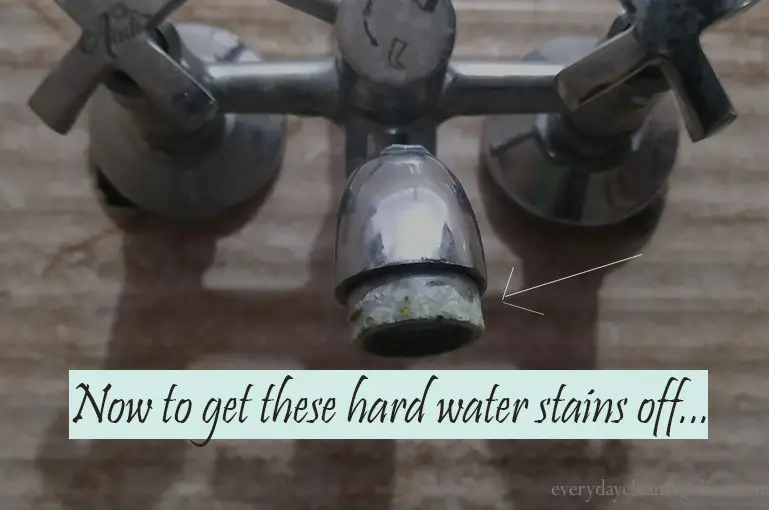
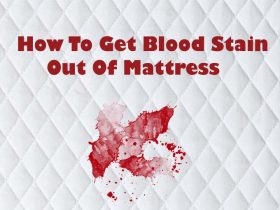

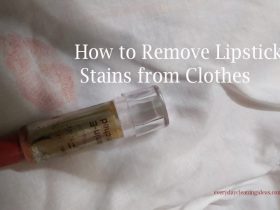

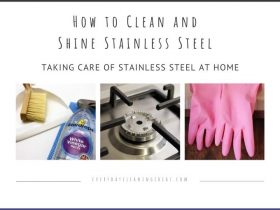
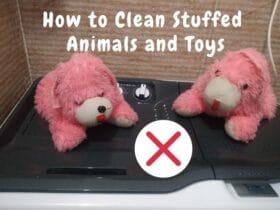
Leave a Reply
View Comments